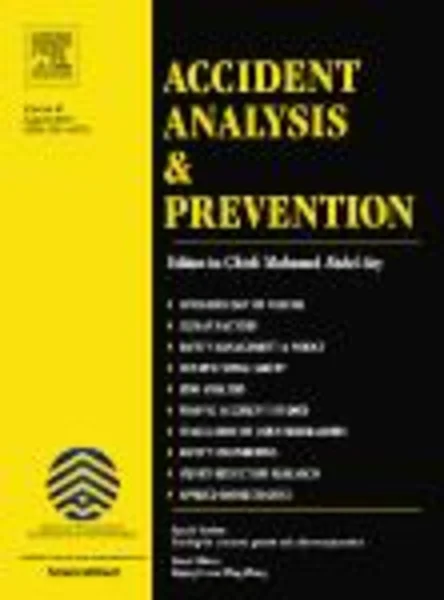-
analytic choices in road safety evaluation: exploring second-best approaches
جزئیات بیشتر مقاله- تاریخ ارائه: 1392/01/01
- تاریخ انتشار در تی پی بین: 1392/01/01
- تعداد بازدید: 565
- تعداد پرسش و پاسخ ها: 0
- شماره تماس دبیرخانه رویداد: -
conducting rigorous before-and-after studies is essential for improving knowledge regarding the effects of road safety measures. however, state-of-the-art approaches like the empirical bayes or fully bayesian techniques cannot always be applied, as the data required by these approaches may be missing or unreliable. the choice facing researchers in such a situation is to either apply “second-best” approaches or abstain from doing an evaluation study. an objection to applying second-best approaches is that these approaches do not control as well for confounding factors as state-of-the-art approaches. this paper explores the implications of choice of study design by examining how the findings of several evaluation studies made in norway depend on choices made with respect to:
1. using the empirical bayes approach versus using simpler approaches;
2. use or non-use of a comparison group;
3. the choice of comparison group when there is more than one candidate.
it is found that the choices made with respect to these points can greatly influence the estimates of safety effects in before-and-after studies. two second-best techniques (i.e. techniques other than the empirical bayes approach) for controlling for confounding factors were tested. the techniques were found not to produce unbiased estimates of effect and their use is therefore discouraged.
مقالات جدیدترین رویدادها
-
استفاده از تحلیل اهمیت-عملکرد در ارائه الگوی مدیریت خلاقیت سازمانی و ارائه راهکار جهت بهبود
-
بررسی تاثیر ارزش وجوه نقد مازاد بر ساختار سرمایه شرکت های پذیرفته شده در بورس اوراق بهادار تهران
-
بررسی تأثیر سطح افشای ریسک بر قرارداد بدهی شرکت های پذیرفته شده در بورس اوراق بهادار تهران
-
بررسی تأثیر رتبه بندی اعتباری مبتنی بر مدل امتیاز بازار نوظهور بر نقد شوندگی سهام با تأکید بر خصوصی سازی شرکت ها
-
تأثیر آمیخته بازاریابی پوشاک ایرانی بر تصویر ذهنی مشتری پوشاک ایرانی (هاکوپیان)
-
بررسی اثرات استفاده از سبوس گندم در جیره جوجه های گوشتی بر میزان جذب مواد معدنی خون
-
عوامل موثر در "انسجام گروهی" و ارتباط آنها با "پرخاشگری" و "افکار خودکشی" در سربازان وظیفه
-
استفاده از ریزجلبک برای بهبود زندگی بشر
-
تحلیل و ارزیابی استراتژی های موثر بر برنامه ریزی توسعه پایدار گردشگری تاریخی شهر یزد با استفاده از مدل swot
-
شناسایی عوامل موثر بر ماندگاری و افزایش عمر قهرمانی ورزشکاران تیم های ملی در رقابت های بین المللی جهانی و المپیک
مقالات جدیدترین ژورنال ها
-
مدیریت و بررسی افسردگی دانش آموزان دختر مقطع متوسطه دوم در دروان کرونا در شهرستان دزفول
-
مدیریت و بررسی خرد سیاسی در اندیشه ی فردوسی در ادب ایران
-
واکاوی و مدیریت توصیفی قلمدان(جاکلیدی)ضریح در موزه آستان قدس رضوی
-
بررسی تاثیر خلاقیت، دانش و انگیزه کارکنان بر پیشنهادات نوآورانه کارکنان ( مورد مطالعه: هتل های 3 و 4 ستاره استان کرمان)
-
بررسی تاثیر کیفیت سیستم های اطلاعاتی بر تصمیم گیری موفق در شرکتهای تولیدی استان اصفهان (مورد مطالعه: مدیران شرکتهای تولیدی استان اصفهان)
-
بررسی تاثیر قیمت گذاری اشتباه سهام بر کسب بازده مازاد آتی
-
جستاری به تعاملات فضا، فرهنگ و هویت ایرانی در تقابل با مفاهیم بنیادی معماری ایرانی
-
مدل سنجش رویکرد برد – برد به عنوان زیرساخت کار تیمی
-
بررسی ارتباط اضطراب کرونا با نگرانی و شدت علائم وسواسی در بیماران مبتلا به اختلال وسواس فکری-عملی
-
calculation of the spatial flooding intensity with unit flood response method in the tangrah watershed, iran




سوال خود را در مورد این مقاله مطرح نمایید :